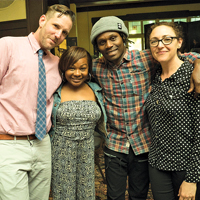The Real Value of Land: Ownership, Not Auction
ATTORNEY JOHN POLLOCK ’94 UPDATES HEIRS’ RIGHTS BY JIM H. SMITH, MALS ’02
Ervin and James Jones and their seven siblings inherited 38 acres of land in the hill country of eastern Alabama. The two brothers—elderly, poor and disabled—loved the land. Ervin envisioned passing his share on to his grandchildren. James harvested timber as the only source of heat for his small home. And they had a vegetable garden.
But the other seven, who did not share Ervin’s and James’ connection with the property, began pressuring them to sell. The brothers dug in their heels and two years ago the matter ended up in court. That’s where Ervin and James Jones got a tough lesson about how co-owners of land can be forced to sell their ancestral property against their will. Adhering to the law as currently written, the court ordered that the entire 38 acres be sold at auction and the proceeds split evenly among the nine.
Ervin and James lost the land that meant everything to them. They are by no means alone. A 1984 study by the Emergency Land Fund found that these so-called par- tition sales are “unquestionably the judicial method by which most heir property is lost.” The problem is especially acute in low-income communities, where owners lack the money to bid on the property at auction or hire lawyers to fight the sale. Throughout the 20th century, courtordered settlements contributed greatly to a huge decline in land ownership by African Americans. It’s estimated that in 1910 African Americans owned 19 million acres of land in America. By 2000 the figure had fallen to fewer than two million acres.
Sometimes the owner clamoring for sale isn’t even in the family. Developers and land speculators may buy a tiny interest in the property in order to become a co-owner who can push for a sale, buy the whole property at auction, and kick the family members off the land.
John Pollock ’94, whose passionate interest in the rights of disadvantaged people took root during his time in Middletown, is trying to help people like Ervin and James Jones stay on their land. It means changing the law one state at a time—a long, hard slog.
When Pollock arrived at Wesleyan in the autumn of 1990 he seemed an unlikely candidate for the career he has pursued. His father was a prominent corporate lawyer and his parents raised him and his older sister in the insular comfort of New York’s Westchester County. “I never realized how privileged I was until I got to Middletown,” Pollock says. “Wesleyan helped me peel back the layers of advantage. It changed my whole life.”
In one of his freshman classes, students were asked to evaluate their lives in the context of “advantage,” using an inventory list to assess the many ways in which they were privileged. “It was a real eye-opener,” he recalls. “There were some things I knew I had, like a family that was financially better off than many. But there were so many other things I just took for granted—my health, the safety of my neighborhood, the quality of my high school, and the fact that my parents were still together. I was mortified by how many items I checked.”
So, Pollock, whose parents had imbued him with a sense of civic responsibility, decided to become an activist, and he applied himself rigorously to the task.
“John came to me with a thesis idea that showed he had a passion for social justice,” recalls Professor of English Sean McCann, Pollock’s thesis adviser. “He was extremely ambitious. He wanted to write about everything, and he was a perfectionist, a remarkably hard worker.”
At Northeastern University School of Law he clerked or interned with the Conservation Law Foundation, the Massachusetts Law Reform Institute, and the Northeastern University Poverty Law Clinic.
“When I graduated from law school in 2005, I was itching to get out of Boston,” he says. “When a position opened with the Southern Poverty Law Center (SPLC) in Montgomery, in January ’06 I jumped at it.”
One day that spring, the Center’s founder, Morris Dees, asked Pollock to look into heirs’ property issues in Alabama. What he found was that African-Americans were not the only population hurt by antiquated laws. Disadvantaged people of every race, in every state, had lost properties that were their leg- acies, and sometimes their only asset.
“The statutes are very old and, historically, court decisions have been predicated on the notion that land has only one value, namely money,” says Pollock. “There’s little protection for owners who don’t want to sell. If you have a situation with many heirs in conflict, the easiest thing for a judge to say is, ‘Sell the damned property.’”
That summer Pollock founded the Heirs’ Property Retention Coalition (HPRC), a voluntary advocacy group whose purpose was to coordinate efforts on land loss for indi- gent communities. He secured a $135,000 grant from the American Bar Association (ABA) and recruited 20 organizations to help him. With their help, he began writing the first draft of what eventually became the Uniform Partition of Heirs Property Act.
“John is a terrific facilitator,” says Craig H. Baab, senior fellow/policy and devel- opment at Montgomery-based Alabama Appleseed, an HPRC partner that researches the root causes of injustice and inequality and develops solutions to improve the lives of all Alabama residents. “He’s a fount of information and he really knows how to mobilize people.”
Pollock devoted nearly all of his personal time over the next four years to mobilizing the Coalition and shepherding the new law. Meanwhile, he became an ABA Civil Gideon Right to Counsel Fellow for the Baltimore- based Public Justice Center.
Last summer his hard work finally paid off. The Uniform Law Commission approved a final draft. “Once enacted, new state laws will not only protect family land, but help families with heir property qualify for credit and otherwise access the land’s value,” said Betsy Cavendish, executive director of Appleseed.
For that to happen, though, state legislatures must now adopt the act. And Pollock’s Coalition is not simply hoping that will happen. Early this year the ABA signed off on the Act. And now, under the leadership of the man who was once “mortified” to discover how privileged he was, the Coalition is working with legislatures nationwide to ensure that property own- ers are not victimized by the courts in the future. A bill to adopt has been introduced in the Oregon legislature and several other states are expected to follow Oregon’s lead shortly. PROFILES


